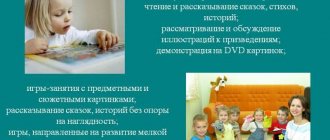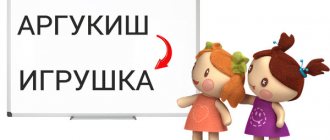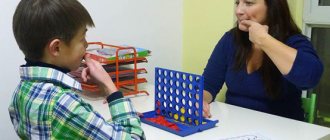Author's didactic game "Gromozeka"
Goal: with the help of a multifunctional author's game, increase the effectiveness of speech therapy, create interest in classes on the formation of the grammatical structure of speech, and create positive motivation in children.
Tasks:
- formation and consolidation of the skill of forming diminutive suffixes;
- consolidation of the use of prepositions “ON”, “C”, “UNDER”, “ABOUT”, “IN”, “FROM”, “FOR”, “BEFORE”, etc.;
- expansion of the active dictionary;
- automation of sounds “R” and “L” in words;
- differentiation of sounds “R” and “L”;
- formation and consolidation of the skill of agreeing nouns with numerals;
- formation and consolidation of the skill of agreeing pronouns with nouns in number and gender;
- practicing quantitative and ordinal recalculation of items;
- development of visual perception and memory;
- formation of spatial representations and orientation on a sheet of paper;
- formation and consolidation of the skill of agreeing nouns with adjectives;
- practicing the skill of using plural nouns;
- development of coherent speech, composing sentences;
The game is multifunctional, its use depends on the tasks of the speech therapist in a specific lesson. It can be used in frontal classes, in individual and subgroup work with children.
Equipment: two posters depicting “Gromozeki” and his room, small cards depicting the same objects that are in the room.
Preliminary work : watching the cartoon “The Secret of the Third Planet” with children, discussing the hero “Gromozeki” (Explaining to children that the hero is fictional, non-existent, so that children learn that in real life there are no persons with so many eyes, ears, etc. .).
Example possible games:
1. Game “Recounting Items”
Goal: formation and consolidation of the skill of agreeing nouns with numerals; working out quantitative calculations,
expansion of the dictionary on the topic “Man. Parts of the body", the formation of spatial representations and orientation on a sheet of paper.
Progress: Guys, let's count the body parts of "Gromozeki" and the objects in his room.
(One nose, two noses, three noses....
One tree, two trees, three trees... etc.)
2. Game “Where is what?”
Goal: to consolidate the use of prepositions “ON”, “C”, “UNDER”, “ABOUT”, “IN”, “FROM”, “FOR”, “BEFORE”, etc.;
Move: Guys, let's see how Gromozeka arranged the furniture and objects in his room (What is in the upper left corner?, Where is the ball?, What is higher - the ball or the table?, Where is that ball? Where is the ring? Where is Gromozeka from? will he take the ring?, etc.
3. Game "Big Small"
Goal: formation and consolidation of the skill of forming diminutive suffixes, development of visual perception, practicing the skill of using nouns in the plural.
Progress: Guys, Gromozeka has large objects at home for him and small ones for his children. Let's try to find them.
(Gromozeka has a table, and his child? (table) And his children? (tables), etc.)
4. Game "Greedy"
Goal: to develop and consolidate the skill of agreeing pronouns with nouns in number and gender.
Move: Children, let's play "Greedy" with Gromozeka
(Gromozeka – whose ring is this? The child is my ring! Gromozeka – whose pencil is this? The child is my pencil, etc.)
5. Game "Detectives"
Goal: automation of the sounds “R” “L” in words, differentiation of the sounds “R” and “L” in words, development of visual perception and attention, development of the skill of sound analysis and synthesis, formation and consolidation of the skill of agreeing nouns with numerals.
Progress: Find objects whose names contain the sound “L”. Count them. Determine the place of the sound L in the word. First count the words whose names contain the sound “R”, then “L”.
(Spoon. One spoon, two spoons, three spoons....
One fork, two forks...; one eye, etc.)
6. Game “Which one?” Which? Which? Which?"
Goal: development of coherent speech, composing sentences; formation and consolidation of the skill of agreeing nouns with adjectives.
Hod: Tell me what objects you see in Gromozeka’s room? Describe them. Make sentences of three words; of four words; with a small word (preposition) “ON”, etc.
7. Game: “What has changed?”
Goal: development of visual perception and memory, development of coherent speech, composing sentences, consolidating the use of prepositions “ON”, “C”, “UNDER”, “ABOUT”, “IN”, “FROM”, “FOR”, “BEFORE” and etc.;
Progress: Children carefully look at the pictures, then the speech therapist removes them and lays out a fragment from small cards, but swapping something in places. The task of the children is to remember what is wrong and to compose a sentence in which to name the correct place of the object, possibly using different prepositions.
(The speech therapist puts a picture of a table, and places a rose on the table. The child must construct a sentence - “There was a ring on the table, not a rose,” etc.)
8. Game "Compare"
Goal: development of coherent speech, composing sentences with opposition, formation and consolidation of the skill of agreeing nouns with numerals, development of visual attention.
Move: Guys, let's compare a person and "Gromozeka" and construct sentences with the little word "A". (A person has one nose, and a Gromozeka has five noses, a person has five fingers, and a Gromozeka has four fingers, etc.)
Not all concepts, categories and topics that can be worked on with children using this manual are described here.
Your imagination will help you apply it in many other ways. For the full text of the material, the author's didactic game "Gromozeka", see the downloadable file
. The page contains a fragment.
| Author: Olga Leonidovna Bukhovtsova → Publisher 10/16/2015 0 4954 361 | Comment |
Thank you for your mark. If you want your name to be known to the author, log in to the site as a user and click Thank you again. Your name will appear on this page.
Login | Registration
Have an opinion? Leave a comment
A child is called a “greedy beef”: working on parents’ mistakes
Walks and trips to kindergarten can turn into a real challenge if your baby flatly refuses to share his toys with the children. But don’t rush to call your child greedy and blame yourself for spoiling him. Let's figure out why he behaves this way and can it be fixed?
Put yourself in his place
When a child does not want to share toys or sweets with others, parents usually feel awkward and even ashamed for him. It’s so unpleasant to hear someone say to him: “What a greedy person! Then play alone." And what a pity for the child: he, too, is worried about the fact that no one wants to be friends with him. So what should we do? Try to look at the situation through the eyes of your baby - and you will see that there are understandable reasons for such behavior.
✓ Firstly, a very young child may not understand that his item will be returned to him. He just sees that he no longer has a typewriter - and is upset about it.
✓ Secondly, he may already have negative experience. For example, a toy that was loaned out had to be returned with a fight, or another child accidentally broke it. No wonder he doesn't want to take that risk anymore. It happens that parents themselves take away some things from the child (sweets or small details - for safety reasons), without particularly bothering themselves with explanations.
✓ Thirdly, perhaps this particular doll that is being asked from him is especially dear to him, and he is not ready to part with it. And he can be understood, because each of us has favorite things that we do not want to lend even to close friends.
✓ And fourthly, he may simply not like the person with whom he is offered to share. Imagine what you would do if a random friend asked you to let her play games on your smartphone. Would you agree? Hardly! So your baby perceives similar requests from others in much the same way.
Child rights in kindergarten
Adult mistakes
We all want our children to be kind, sympathetic and liked by others. Therefore, parents worry when their child shows greed.
Unfortunately, this often pushes adults to make mistakes that further aggravate the situation. What not to do if you want to teach your child to be more generous?
✓ Do not shame him or call him greedy under any circumstances. Any labels in such a situation are pressure on the child. It’s as if they are telling him, “Be good, otherwise your mother won’t love you.” Do not force your child to share, because kindness and generosity cannot be taught by force.
It is very important to always be on your child’s side and not put the interests of someone else’s child above those of your own. The child needs to know that you support him, then he will be able to relax and stop defending his property so actively.
✓ If he asks to return his toy, do not persuade him to let the other baby play a little more. If a child cannot get his item back upon request, how will he understand that sharing is safe?
We teach by example
In order to cultivate generosity in a child, two conditions are necessary.
The first is the personal example of parents. The child should see that his family members share pleasant things with each other and enjoy it. This way, he will understand that generosity is a natural behavior towards someone you like, and that it evokes sympathy and gratitude in return.
The second important condition is respect for other people's property. You can only be truly generous when you know that no one will take away what you have or take it without asking. Therefore, it is important that from childhood a child learns that not only he cannot take their things without the consent of his parents, brothers or sisters. But those around him should also ask his permission, and, if necessary, persuade or change with him, but just not take his “property” against his will.
We share according to the rules
Unfortunately, children are not always able to come to an agreement with each other, so your child may need your help on the playground or at a party. If you see another child asking your little owner for a car, help the children find a common language. If your baby doesn't want to share, suggest they swap toys, but don't insist. Let children know that “no” is also an answer, and they have every right to it. If your child agrees to the exchange, offer the children, as well as the parents of the second child, the following rules:
1 Set the time for which children exchange toys. Of course, kids may not yet understand what “five minutes” means, but it’s worth slowly teaching them the concept of time. Moreover, such a boundary is important not only and not so much for children, but for you and the second parent.
2 Be sure to say that if one of the children wants to return their item before the expiration of this period, they will need to give it back.
3 Explain to children that other people's things must be handled with particular care and attention.
Scientists say...
It's a matter of age. Feelings such as fairness and responsiveness begin to emerge in children around age 7. Usually the youngest children in the family are the most greedy. And the only ones turn out to be more generous.
Preventing conflicts
To make it easier for your child to communicate with peers, try to prevent children's quarrels or put them out without letting them flare up.
When you are going to the playground or visiting, try to convince your child not to take with him his most favorite toys, which he definitely does not want to give to anyone. Explain that they can get lost or break during a walk or trip - wouldn’t it be better to leave them at home, safe?
If you are expecting guests, ask your child to remove from a visible place those things that are very dear to him. But at the same time, ask him to think about what toys he is ready to offer to his friend for play or temporary exchange.
But what to do if a quarrel is brewing: the children literally tear the doll to pieces, not wanting to give it up to each other? Try to distract them by offering them other toys or some exciting activity, preferably a joint one. Perhaps, having gotten to know another child better, your baby will become more accommodating.
Expert: Alexandra Volokhova, psychologist
Finger gymnastics
Cabbage We chop and chop cabbage, We salt and salt cabbage, We three and three cabbage, We press and press cabbage. (Imitation of movements.)
Vegetables Little girl Zinochka has Vegetables in a basket: Children make their hands into a “basket”. Here is a pot-bellied zucchini. Bend your fingers, starting with the thumb. She put it on the barrel, Pepper and carrot. She laid it deftly, Tomato and cucumber. Our Zina is great! Show thumbs up.
How many beds are there in the garden? In Fedora's garden there are tomatoes growing in the beds, and in Filat's garden there are a lot of different lettuces. Grandma Fyokla has four beds of beets. Uncle Boris has a lot of radishes. Masha and Antoshka have two rows of potatoes. Alternately bend your fingers for every two lines of text.
“Harvest” Glad, two, three, four, five - Alternately, clap your palms, then your fists. Let’s help you collect the harvest. Repeat the exercise after me. Bend your fingers for each name of the vegetable. In it, the sound T came to the garden bed. Here's a pumpkin, and here's a tomato. Here is cabbage, here is lettuce, caraway seeds, potatoes, artichokes and parsley roots. Everything that we have grown, We alternately clap our palms and then our fists. We will eat until spring.
Logorhythmic exercises (coordination of speech and movement)
Potatoes We dug up potatoes, picked cucumbers from the ridge, pulled out all the carrots, deftly cut the cabbage and brought it to you as a gift in a basket from the ground. (Squats, bends, imitation movements.)
Vegetable Garden Repeat the exercise after me (Step in place.) We came to our garden bed. Here's a pumpkin, and here's a tomato. (Extend your arms to the left, to the right.) Here is cabbage, here is lettuce. (Bend over to your left leg, then to your right.) Cumin, potatoes, artichoke (Straighten up. Hands on your waist, to your shoulders, up.) And parsley root. (Lower your hands.) Everything that we have grown, (Spread your arms to the sides.) We will eat until spring. (Hands down, straighten up.)
Lexical topic “Vegetables. Garden"
We enrich and activate our vocabulary. We consolidate knowledge of nouns : salad, soup, juice, cucumber, tomato (tomato), potatoes, beets, carrots, onions, turnips, cabbage, radishes, peppers, garlic, eggplant, zucchini, squash, greens, parsley, dill, radish, pumpkin , beans, beans, peas, pods, tops, roots, fruits, seeds, tubers, leaves, head of cabbage, salad, beetroot, vinaigrette, juice, bag, box, path, harvest, vegetable garden, bed, soil, planting, watering; adjectives: colorful, large, long, short, triangular, oval, ripe, unripe, ripe unripe, raw, boiled, hard, soft, bitter, sweet, sour, salty, juicy, healthy, light, heavy, fresh, large, small , red, green, yellow, ripe, unripe, tasty, tasteless, sweet, sour, bitter, salty, pickled, canned, raw, boiled, healthy, large, small, round, oval, elongated, oblong, smooth, ripe, fragrant , aromatic, juicy, vegetable; verbs: plant, care, grow, sow, loosen, ripen, water, ripen, collect, sprinkle, pull out, dig, cut, wash, rub, cook, stew, fry, eat, crunch, prepare, salt, ferment, preserve, pickle, grow, grow, ripen, water, weed, clean, dig, pick, pull out, collect, dry, squeeze, rub, treat, clean, share; adverbs: high, low, tasty, tasteless, healthy, harmful.







